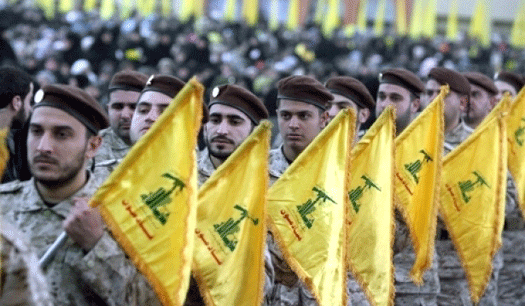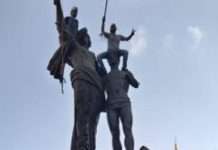Hassan Nasrallah is no champion of free speech
Tariq Alhomayed /Asharq Al Awsat
Tuesday, 13 Jan, 2015
It is not surprising that a merchant of death like Hassan Nasrallah, the leader of the Lebanese Shi’ite group Hezbollah, has attempted to use the terrorist attack on the offices of French satirical newspaper Charlie Hebdo to burnish the public image of his group. Nasrallah claimed Sunni takfirist groups, such as those assumed to have carried out the attack, had insulted the Prophet Muhammad more severely than those they attacked ever had.
But the truth—which everyone in our region knows—is that Hezbollah is hardly concerned with people’s freedom, nor protecting them, and that the group is not one that seeks to avoid bloodshed, or even respect the religious beliefs of others. Hezbollah, and all Iran’s allies in the region, are guilty of inflaming sectarian tensions there—and, of course, guilty of much more than that. Nasrallah claims that through carrying out the attacks in Paris, the takfirists themselves have managed to besmirch the image of the Prophet more than their enemies were ever able to. At this juncture, one might put to him the following question: why then did you, and Bashar Al-Assad, support the many marches through Lebanon and Syria which condemned the cartoons by Danish newspaper Jyllands-Posten depicting the Prophet Muhammad? Abdulrahman Al-Rashed has also pointed out in this paper recently how Iran issued a fatwa against the author of The Satanic Verses, Salman Rushdie, threatening to kill him and arm anyone or any group willing to do so. He also reminded us how “Iran, which fumed over Rushdie’s novel, also allows thousands of books to be printed each year which directly insult the Prophet’s companions.”
But it doesn’t stop there. One could also ask Nasrallah, this man who has the blood of thousands of Syrians on his hands and is also apparently a guardian of free speech, why the Assad regime’s thugs broke the hands of famous Syrian cartoonist Ali Farzat, who had been critical of Assad, shortly after the revolution against the regime began? Back then, Nasrallah didn’t move an inch to defend Farzat or freedom of speech.
One can also ask Nasrallah the following: what is the difference between these takfirists who kill thousands of people, and the Assad regime and its supporters, among them Hezbollah and Nasrallah himself, who also kill thousands of people? Moreover, if the leader of Hezbollah is so “moderate,” as he claims to be, then why does he not tell us who assassinated Samir Nusair and anti-Syrian editor and politician Gibran Tueni in the same year in Lebanon?
The truth is that Nasrallah is simply attempting to polish his image in front of Lebanese and regional public opinion, and the rest of the world, by portraying himself as “tolerant,” in order to brush over the crimes his group has committed in Lebanon, Iraq, Syria and Yemen. For Nasrallah is fully aware that the world is now a different place following the Paris terror attacks. The region and the world must all be aware of this deception by Iran and all its allies. Before it, of course, came the first deception— a prime example of taqiyah (dissimulation)—which occurred right after the 9/11 attacks. What the world must not forget is that Hezbollah not only fans the flames of sectarianism and terror in the region and beyond, but that it is also one of the most prolific practitioners of these dark arts. The most obvious example of this is of course what the group is currently doing in Syria, where it is at the very least complicit in the Assad regime’s horrendous crimes
فرنسا وادعاءات حسن نصر الله
طارق الحميد/الشرق الأوسط
13 كانون الثاني/15
كعادة تجار الدماء، وزعماء الميليشيات في منطقتنا، يحاول حسن نصر الله الآن استغلال الاعتداء الإرهابي الذي استهدف مجلة «شارلي إيبدو» الفرنسية لتلميع صورة حزبه المتورط بالدماء بمنطقتنا، وذلك للقول بأن الجماعات الإرهابية «التكفيرية» أساءت إلى الإسلام والرسول أكثر من أعدائهما! والحقيقة التي يعرفها الجميع بمنطقتنا أن حسن نصر الله، وحزبه عموما، والأجندة التي يخدمانها، لا يكترثون بالحريات، ولا صونها، ولا يسعون لحقن الدماء، كما أن آخر همومهم احترام الأديان، أو الطوائف والجماعات، والدليل أن حزب الله، وكل حلفاء إيران بالمنطقة، هم من يأججون الطائفية، وأكثر. فعندما يقول حسن نصر الله الآن إن «التكفيريين» قد أساءوا للإسلام والرسول عليه الصلاة والسلام أكثر من أعدائهما، فإن السؤال هنا هو: ولماذا تاجر حزب الله، ومعه بشار الأسد، بالمظاهرات المنددة بالرسوم الكرتونية في الصحيفة الدنماركية، من قبل، وأخرجوا لها المظاهرات؟ وكما كتب قبل أيام في هذه الصحيفة الأستاذ عبد الرحمن الراشد، والذي ذكّر أيضا بافتعال إيران لأزمة «معركة رواية سلمان رشدي ضد بريطانيا» والتهديد «بقتل المؤلف، ودعم أي عملية إرهابية». كما أشار الراشد بمقاله، وذلك لتوضيح زيف مواقف حزب الله، وإيران، إلى أنه «لم يقل أحد إن إيران التي ثارت على رواية رشدي هي نفسها تسمح بآلاف الكتب التي تسب صحابة الرسول»!
والقصة لا تقف عند هذا الحد، فبينما يحاول نصر الله اليوم تلميع صورته، وهو المتورط في الدم السوري، فإن المتابع يتساءل: طالما أن نصر الله يدافع عن الحريات ويرفض العنف، فأين كانت حكمته المفاجئة هذه حين قام نظام الأسد بتكسير أطراف رسام الكاريكاتير السوري الشهير علي فرزات بأحد شوارع دمشق، وبعد اندلاع الثورة؟ حينها لم يدافع نصر الله عن فرزات، ولا الحريات، والسؤال هنا أيضا: ما الفرق أصلا بين «التكفيريين» والأسديين، سواء الأسد نفسه، أو من يدافع عنه، ومن ضمنهم نصر الله؟ وإذا كان زعيم حزب الله «معتدلا» كما يدعي، فلماذا لا يقول لنا من الذي اغتال سمير نصير وجبران تويني في لبنان، وبنفس العام؟
الحقيقة أن ما يحاول نصر الله فعله الآن هو خديعة الرأي العام، والمجتمع الدولي، في محاولة منه للظهور بمظهر المتسامح، وذلك للتغطية على جرائم حزبه في لبنان والعراق وسوريا وكذلك اليمن، فنصر الله يعي أن العالم اليوم بات مختلفا بعد الجريمة الإرهابية التي وقعت بفرنسا، ولذا فيجب التنبه اليوم، عربيا، ودوليا، لمحاولات نصر الله، وكل حلفاء إيران الحالية لخديعة المجتمع الدولي، فيكفي الخديعة الأولى، أو التقية، التي مارسوها بعد أحداث سبتمبر (أيلول) الإرهابية في أميركا. وعليه، فيجب أن لا ينسى الجميع اليوم أن حزب الله شريك بتأجيج التطرف والإرهاب، بل هو من أبرز منفذيه بالمنطقة، والأمثلة على ذلك كثيرة، وأبرزها ما يفعله الحزب في سوريا الآن دفاعا عن جرائم الأسد.


















